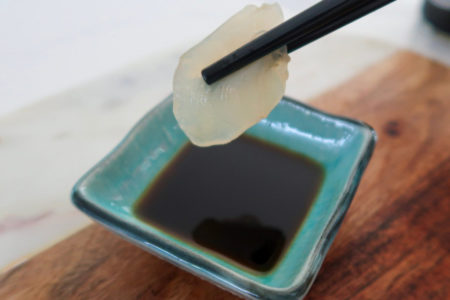Originally published by Jill Ettinger (in Green Queen)
U.S.-based Aqua Cultured Foods says it is the first company in the world to create whole-muscle cuts of vegan seafood from a proprietary biomass fermentation process.
As demand for alternatives to conventional seafood increases, Chicago-based Aqua Cultured Foods says it has perfected vegan “whole muscle” cuts of sushi-grade tuna and whitefish along with the number-one selling seafood item in the U.S. shrimp.
Consumers are seeking alternatives to seafood for a number of reasons, namely the state of the world’s oceans. Overfishing is responsible for species and ecosystem losses. There are issues linked to plastic waste, now so ubiquitous in the oceans that experts say pieces of plastic could outnumber fish by mid-century. Other issues are pervasive as well, such as coral bleaching—often a result of factory farm runoff—and antibiotics from fish farming that contaminate wild-caught species.

This has made fish, once considered the healthiest meat source, a dietary risk. From mercury and heavy metals, to dioxins, PCBs, antibiotics and microplastics, consumers are seeking to shift away from ocean-sourced fish.
Enter biofermentation.
“Fermentation was largely unexplored for growing seafood alternatives, so we saw the opportunity to fill a white space in the market by creating a one-to-one replacement that’s realistic enough even for sashimi, nigiri and ceviche,” Aqua CEO Anne Palermo said in a statement. “By nailing the taste, texture and nutritionals, we’ve developed something of a holy grail in the entire alternative protein space.”
According to the company, its seafood offerings, which include tuna, whitefish, shrimp, and calamari, are nutritionally similar to omega-rich cod with the added benefits of fiber and being free from saturated fat or cholesterol.
Biofermentation
The vegan seafood combines biofermentation with a proprietary fungi strain that allows Aqua to grow the protein instead of ingredient processing.
The brand emphasizes that this is not cell-cultured meat—there is no animal tissue involved as is the case with other startups in the space, like Wildtype. It’s growing tuna from samples of muscle tissue.
“The seafood-alternative category is not yet dominated by any established companies as the category is still a white canvas for new entrepreneurs to create amazing plant, cell and fermentation enabled seafood products,” said Andrew Ive, founder/general managing partner, Big Idea Ventures.
“Each new product needs to deliver on taste, texture and nutrition while being a price aligned with customer traditional expectations. Aqua Cultured Foods has solved these issues elegantly to create a realistic product with a nutritional profile that often exceeds fish from the ocean.”
Aqua says it should be to market with the seafood alternatives by early 2022.
Vegan seafood for all
One of the big questions for founders is how to name these new protein products in order to describe the technology accurately while also making the product accessible and easy to understand. Palermo told Green Queen that naming conventions are tricky: “We want to call the protein by a name that is familiar to the consumer, and therefore more approachable. However, we also want to emphasize the differences so that consumers know that they are choosing to consume a protein that not only tastes delicious but is sustainable and helping to create impactful change to better our global community.”
Aqua’s tuna and white-fish are made from micro-organisms that are entirely plant-based and the products are vegan. They are safe for those with allergies- not only is their raw protein free from the top 8 allergens, the company also uses plant-based flavors, so they can be consumed by those with shellfish and/or seafood allergies.


